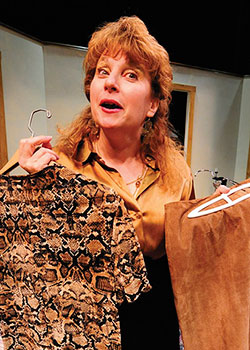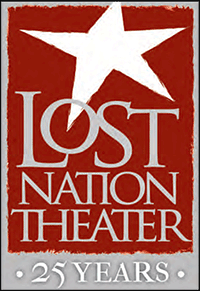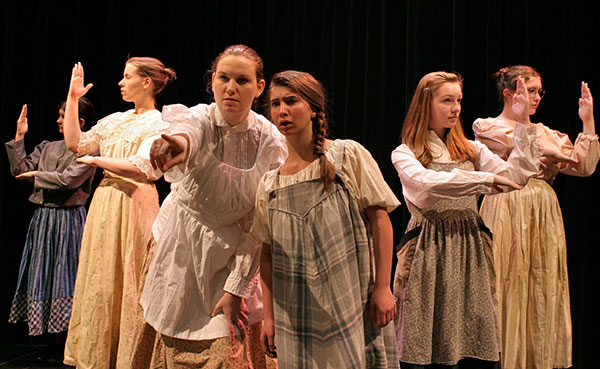| Kathleen Keenan – Central Vermont’s Favorite Drama Queen | |
| by Bronwyn Fryer | |
You and I all know women who are solid soul. Women who stand for something. Women whose work you look at and think: “You were definitely put on this planet for one very big reason.” At first glance, Kathleen Keenan would not strike you as such a woman, because she’s no Queen Latifah. Standing barely above 5 feet tall, she almost hides beneath her bountiful, curly, brown hair. Look into her almond-shaped green eyes, and you’ll see the impishness of someone who is much more interested in mime than in muscle. Ask her a direct, personal question about herself, and she’ll demur for a while, hem and haw, and finally cough up a tidbit. But get her to work as a driving force behind a piece of amazing theater, or a poignant song, and watch as the waves part. This small, intense woman not only knows the power of theater—she is the power of theater. New York Tenderberry Keenan, 51, started out like so many pubescent girls who fall in love with the smell of greasepaint. St. Patrick’s Elementary, a parochial school in Huntington, Long Island, put on a series of melodramas. In one, called He Ain’t Done Right By Nell, the tiny seventh-grader played the busybody neighbor. “The villain didn’t hear his cue, so I improvised a line,” she said. “The adrenal rush and the joy in ‘saving the moment’ really sealed my theatrical fate.” |
Kathleen Keenan starring in Bad Dates. |
Keenan was born gifted, and was nursed on music and acting. Her large and “abnormally tight-knit” Irish-American Catholic family was packed on both sides with entertainers: rollicking storytellers, clowns, and talented musicians. Her father, Charlie, an electrical engineer, played old Irish songs and original tunes on the guitar and organ. Her mother, Pat, a lover of Broadway musicals, had a voice like Sarah Vaughn’s; she passed on her vocal gifts to her daughter. Kathleen began taking organ lessons at the age of five, and soon became so good at it that her teacher wanted to groom her for the concert stage—“an idea that horrified me,” says Keenan. The family was always up to some theatrical something. “When I was 9 or 10, my sister organized the kids in the neighborhood, and we put on A Christmas Carol for the neighbors, in the basement of the family up the street,” she recalls. “We hung a sheet for a curtain, and my sister made a playbill. I think I might have played Scrooge’s sister Fan, or one of the boys who ask Scrooge for money.” When she was about 12, Keenan inherited a guitar, and began learning popular songs by James Taylor, Joni Mitchell, and John Denver. She soon formed the band “Flight,” with some boys from the neighborhood, and sang a mean lead as well as harmony on songs like the Beatles’ “Oh Darlin’” and The Who’s “Pinball Wizard.” By the time Keenan was 14, she was writing her own songs. The first was a histrionically named lament, “Lost and All Alone in Some Forgotten World.” Keenan eventually studied classical and jazz guitar, and it shows. When she sings and plays, Keenan displays impressive knowledge of the guitar, and sings in a lovely, strong alto voice, with a light, fast vibrato. When rocking, her ferocious voice threatens to tear down the walls. No Amateur Keenan was the kind of hard-working, devoted kid who would prove that she could do just about anything, from building sets and running lights, to taking the bittiest of bit parts. She took part in every single school play. By the time she got to college, there was no question about her major: “People wanted me to major in music, but I was drawn to the theater….I learned that I could combine music and theater in a new way, and it changed my path,” she says. “I realized I could create my own material without having to fit into an acting box, and that there are other avenues out there for a creative career.” Her senior thesis college project was an original production; she directed, cast, and wrote the music for the piece. After graduating in 1984, Keenan joined the Poetry Performance Ensemble as resident composer of and performer in four original off-Broadway shows, that included the poetry and letters of T.S. Eliot, E.E. Cummings, Marianne Moore, and others that Keenan set to music. To keep body and soul together, Keenan worked part time as a bank teller (where she learned accounting skills that would come in handy later). She performed as a clown at children’s birthday parties. She sang in bars and clubs around New York, and occasionally directed shows. As a performance interlude at Lincoln Center in 1986, she performed a number of Russian poems set to music. A Theater Pair One day in 1984, the department chair at her alma mater called the accomplished 22-year old, and asked her to direct a performance of The Fantasticks. Among those who auditioned was a tall, good-looking man who was part of a group audition for a different play. “He was just an amazing actor,” Keenan recalls. “He had this intensity about him; he understood what the department chair wanted more than anyone on the floor. He was just a force of nature.” The actor was Kim Bent, a native of Braintree, Vermont, who had come to the school as a graduate student. He was 14 years her senior, but he seemed her contemporary. Not long afterwards, another colleague asked her to perform in a play by Bertold Brecht in which Bent had been cast. “We were standing in the hallway waiting for the rehearsal room to open up, and I had my guitar with me,” she recalls. “Kim said he needed a musician for a show based on an epic poem called “The Gunslinger” that he was doing as his master’s thesis.” Keenan agreed, and eventually the two metaphorically withdrew stage left for what was, let’s just say, a very long kiss. The two have been together ever since. Bent moved back to Vermont, where he had established Lost Nation Theater (LNT) some years before as a touring company producing original works. The two carried on a commuters’ romance until Keenan joined him in 1988. They were wed on the Bent family farm. She was just 26 years old. They moved to an apartment on Langdon Street in downtown Montpelier. To make ends meet between tours, Bent taught theater at Middlebury College as an adjunct professor, and did carpentry; Keenan sang and played in clubs around Vermont and taught guitar at U32 High School in East Montpelier. New Roots Then one day in 1989, the city of Montpelier advertised in the theater publication Variety that it was looking for a company to run a summer theater. Keenan and Bent jumped on the opportunity, and their proposal was accepted. To their dismay, all the city was offering was free rent. And the space in City Hall was “a dive. Plaster was falling from the ceilings, and the place was a mess,” Kathleen recalls. “We had no money, but Kim used his carpentry skills to fix up the place a bit, and we put together some shows. I thought that if we could just sell 40 tickets a night that we could break even, but of course I was thinking like a New Yorker.” She pauses. “We did a piece called Dooryard Dreams, about the changing face of Vermont, and brought in some of our actor friends from New York.” Other pieces were Scenes and Revelations, Gunslinger, and Sam Shepard’s Tongues and Savage/Love. She says, “We worked so crazily and so hard to put on four plays. And the biggest audience we garnered was only 18 people. We lost all our money. Checks were bouncing. Then I figured it was time to get serious about bringing some money in here.” Keenan realized they weren’t in New York. “We got a board together, and learned to write grants,” Keenan says. “We knew if we could deliver quality theater, that over time we’d develop a devoted audience. And if we were lucky, we might even find a few guardian angels.” Tony-winning playwright and director Emily Mann said that LNT’s “production of my play [Having Our Say] was one of the best I’ve ever seen. In an unsolicited letter to Keenan and Bent, she went further: “This is regional theatre in the truest sense. I was amazed and delighted by the community response and support. I just wanted to tell you how impressed I am with the artistic quality of the production and the extent to which they used the play to initiate talks about tolerance in their community. They are involved in every facet of their community, from educational and mentoring programs for young people, to local business revitalization and tourism, to support of local artists. At the same time, co-artistic directors Kim Bent and Kathleen Keenan are building Lost Nation into a first-rate theater.” LNT’s mission is to deliver “opportunities for empathetic understanding,” which is what theater at its very best does. “We want to affect people, to provoke people—not to incite, but to engender conversation and thinking,” Keenan says. “Of course we want to entertain, and tell a good story, but the transcending power of theater is a value for us. Plays—even the lightest, most comedic ones—get us thinking differently, and give us an opportunity to stand in someone else’s shoes, and walk around in them for a while.” Dancing Backwards on Heels Many of the most powerful LNT plays that evoke “empathetic understanding” are focused on women, some of whom spring from the Vermont region. Consider Lyddie, an astonishing, original play that LNT staged in 2012. To me, Lyddie represented everything that sparkles about LNT’s vision. It revealed the power a fairly small group of actors, under the hands of masters, can deliver. Based on a young-adult novel by renowned local author Katherine Paterson, Lyddie was a searing representation of an impoverished Vermont orphan girl who, separated from her siblings, went to work in a Massachusetts mill. The play took more than three years to develop. “I was not even halfway through reading Paterson’s book,” Keenan recalls, “and I said to myself, ‘This is an important story, and it has got to be a play with music and dance.’” The title role was played by a childlike, hyper-talented 17-year old actor named Liz Gilbert, who first came to LNT as Scout in To Kill a Mockingbird. Lyddie was an artful study: of young women who slaved all their waking hours for a pittance, of broken dreams, of patriarchal power, and ultimately of redemption. Bent and Keenan scripted the play, and Keenan wrote the music for it. The staging included an inventive, highly choreographed trope of the women at work: The actresses used their arms to mime the mechanical chatter of looms. Other important women’s plays have included Shirley Valentine, about a middle-aged “empty nester” who, realizing she’s lost herself because she’s put her kids and husband first for so long, dares to rediscover who she is. Educating Rita revealed a lower working-class woman who defies society, her background, and her husband to get herself an education. Having Our Say told the story of the remarkable Delaney sisters, aged 102 and 100, looking back on their lives as the children of slaves in the South. The sisters had worked their way up and through and over obstacles to pursue professions, and buy their own home in Mt. Vernon, New York. “Those two women fought all obstacles,” Keenan says. “One became the first African American women to teach high school. The other became a highly respected dentist. They immersed themselves in the Harlem Renaissance, fought for equal rights for women and people of color. They were fierce, inspiring women. Neither ever married. They made their lives, their families’ lives, and their communities better. Even in their very advanced years, they were still engaged with life. And they lived to see their story premiere on Broadway. “We did a bucket load of outreach with Having our Say,” Keenan notes. “It galvanized a community discussion about prejudice and barriers…. We ran forums, held talks. The whole community was talking about the effect of that show.” Fearless Controversy Late in 2013, LNT staged Arthur Miller’s classic play The Crucible, set in Salem, in 1692. Miller wrote it in the midst of 1950s anti-Communist paranoia gripping the country, and urged on by then-popular Sen. Joseph McCarthy. He’s a figure that reminds me of Ted Cruz and far-right tea-party politics today. The Crucible is a study of groupthink, persecution and the extremes of human cruelty. Keenan played Elizabeth Proctor, the wife of the central figure who loses his life rather than confess to witchcraft. One by one, Proctor’s neighbors are accused and pressured to confess and escape hanging. Proctor argues for truth and his wife stands by him. “Playing Elizabeth was challenging,” Keenan says, “because of the extremely heightened situation of the play. It’s all about complex humanity in the face life and death, right or wrong. There was this ingrained superstition and belief in evil witches, a deeply rooted belief that judges and the court were God's representatives on earth. Being called before the court was like being called before God. “It was difficult to play a very still character like Elizabeth, whose naturally repressed, still, reserved nature was described by men as ‘cold,’” she continues. “I had to reconcile my own ideas of what Elizabeth must have been thinking and feeling with the terrible, patriarchal words on the page. Elizabeth spends much time on stage without saying any lines. She is often simply listening. She does not move much. As an actor, staying still for long periods of time is much harder than moving about.” Women’s Hearts and Voices What other challenging roles has Keenan played? “That's a very hard question to answer because, as an actor, your increased capacity with greater experience in life and in performance makes a huge difference. For instance, I could not have played Emily Dickinson in Belle of Amherst, or more recently Elizabeth Proctor, without having [first] played a blind woman named Molly Sweeney in 2004’s Molly Sweeney.” Why? “Because the stillness I had to learn for a woman who has an operation to restore sight was so foreign to me that I—Kathleen the actor, not the character—wept through many a rehearsal.” The powerful voices of women playwrights and directors have always stood foremost in LNT’s roster of performances. Hungry Heart, a play produced by Bess O’Brian, offered searing testimonies of real-life women who had survived battering. Another play, “The Ballad of Little Jo, told the story about a woman who passes as a man in the American West. Intake, by Margaret Lasher, was a comedy on aging and perceptions. February 6-8, at 7:30 pm, LNT will do a repeat performance of Eve Ensler’s Vagina Monologues. On Sunday Feb. 9, there is a 2:00 pm matinee performance. Says Keenan: “One of the best things about Vagina Monologues is how it is a very entertaining catalyst for conversation. Despite all the progress that’s been made, statistically, with women’s rights and equality issues, there’s still a prevalence of understood roles, restrictions, hierarchy, and choices. “Ensler’s piece is a roller-coaster of times when men and women can all laugh together in breathless recognition of the moments in which we all feel the direct and collateral damage of abuse.” We need this kind of theater. We need to hear these women’s voices, digging into us. LNT makes them sing. In a time when women’s reproductive rights are still under siege in many quarters, when women continue to earn less than men for the same job, and when many women struggle to make themselves and their children safe, secure, and strong in the world, plays like those staged at LNT can make a difference. They speak to our higher good. They force us to think. They touch chords of empathy.
The cast of Lyddie, set in an early mill operated by young women, mimes the mechanical chatter Keeping LNT Alive Over the years, Keenan and Bent have built up a devoted following for LNT in Vermont and beyond, but they can’t afford to rest on their many laurels. They live in a small, bare-bones apartment into which they cram friends and well-wishers for potlucks. Every spare dime goes back into the theater. Sustaining life on a shoestring for so many years has been tiring. The tiny staff—four full-time people including Keenan and Bent, two part timers, and a core of volunteers—make the productions look flawless, but the pay is thin, and the work overwhelming, often requiring 16-hour days from everyone. Raising money is an ongoing struggle. “We are dependent on the kindness of strangers at all times,” Keenan says. “We’ve been very blessed with people who have helped us, but we could always use more to help us realize our dreams for bigger, high quality shows, education programs, a youth company that might go to schools….” She can’t seem to help dreaming those large inclusive dreams. Characteristically, LNT is contributing a benefit from “Vagina Monologues” to Circle, a local non-profit organization that advocates ending violence against women. So bring your friends and help keep Keenan’s calling alive in Vermont–the brilliant, empathetic reflection of women’s experience. For more information about Lost Nation Theater, see www.lostnationtheater.org.
|
|
| Bronwyn Fryer lives and writes in Montpelier.
|
|


